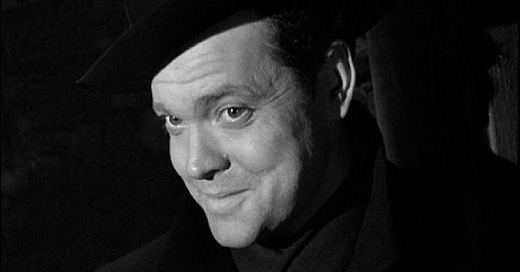MOVIE MINUTE TWO: Orson, Always Ready for His Closeup
“There’s something about Orson Welles’ smile at that point that shifts everything to another level, and it sustains no matter how many times you see it.”
The Third Man, Reed’s masterful (second) collaboration with the legendary author, Graham Greene, has been has been described as “the greatest British thriller of the postwar era,” and that might be underselling it a bit. Its direction is bold and assured; its dialogue, snappy; its cinematography, absolute noir-y brilliance; its music, unforgettable (though I’m not sure that’s a compliment); and its performances (particularly those of Joseph Cotten and Trevor Howard) are pitch-perfect.
Technically, and artistically, it’s a tremendous film. Yet all of the (many, many) things that it does well pale in comparison to the towering, dominant presence of its “leading man,” Orson Welles, whose (roughly) 10 minutes of screen time over the course of the film’s tightly-paced 93 minutes impact the film in a way that is wildly disproportionate to their length.
Over at the (always fun) Cinephelia & Beyond website, there’s an article, “Carol Reed’s ‘The Third Man’: How Orson Welles Stole a Show He Was Barely In.” …and that might be underselling it a bit. Welles doesn’t steal The Third Man, he IS The Third Man, and it’s well-nigh impossible to watch the film without being drawn once more into the vortex of his mesmerizing Harry Lime. Every time I rewatch the film, I find myself struggling to appreciate its overall brilliance, so quickly and deservedly do I fall under the spell of Welles’ performance.
Looking/listening back on my one-time podcast, I realize I’ve thought this about Welles (and his place in Carol’s film) for a very long time.
“It’s not just a dramatic revelation—there’s something about Orson Welles’ smile
at that point that shifts everything to another level, and it sustains no matter how
many times you see it. Welles comes into the picture about halfway through.
That’s the first time you actually see him, after you’ve spent so much time picturing
him in your mind because everyone has been talking about him and thinking about him. So that might be the best revelation—or the best reveal, as they say—in all of cinema.” — Martin Scorsese





